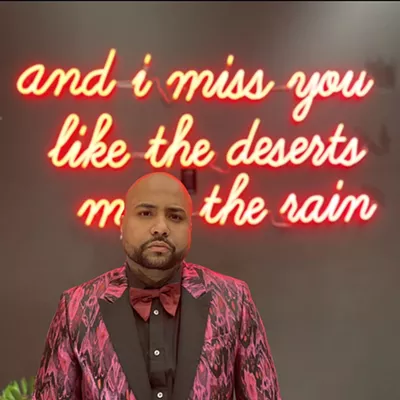When guitarist Casey Calvert died suddenly at the start of a 2007 tour, Hawthorne Heights naturally came unglued.
They had lost a close friend, and their music had lost an important reconciling element: Calvert's visceral, tormented screams had held the glee-club lilt of the band's vocal harmonies together with the contrasting despair of their lyrics and fight of their guitar attack. Calvert's scream was the scream that all of us stifle as we slog harmoniously through our drudgery and the social carnage all around us. That scream was Hawthorne Heights' most resonant characteristic.
Calvert's death was apparently accidental, the result of a toxic combination of prescription medications. Hawthorne Heights decided to soldier on without him, but not to replace him. The band's 2008 Victory release, Fragile Future, was a tribute of sorts to Calvert, but also an epilogue.
"We just wanted to leave (screaming) off the last record," says guitarist and vocalist J.T. Woodruff. "We wanted to try to fill his void just with our own voices."
With Skeletons, set for release in the first quarter of 2010, Hawthorne Heights has moved on, aided in part by a new label affiliation, Wind-Up Records, home of Creed, Seether and Evanescence. Among other things, Skeletons can be expected to put the screamo back into the band's platinum-selling emo pop.
"We've all learned to do that a little bit now," says Woodruff, "so there's a lot more of that tension."
Woodruff says the new record also holds some surprises. "There are a couple of ballads," he says. "We've had slower songs on our records, but we've never really explored ballads. But there's a lot of rock as well, so it's a really good balance."
He credits Wind-Up with encouraging the group to stretch while still allowing the band complete creative control. "They did say, 'Hey, why don't you try some stuff outside of what you traditionally do, and just go for it?'"
Although Skeletons is being mixed right now, the band intends to keep fans guessing. Woodruff promises just one new song, "Unforgiveable," at the band's show this week at The Rock, but fans can have it as a keepsake. "You just show up, and we'll give it to you to take home," he says. "It's a little download card. ... It's really easy and cool."
The rest of the show will be a look back down a road that's tested the band's resilience and commitment through its hairpin turns.
Woodruff formed Hawthorne Heights in 2001 from the broken pieces of A Day in the Life. Hawthorne Heights forged a following playing all-ages shows in venues like Knights of Columbus halls. Then they extended their reputation by leaving town, as often and for as long as possible.
By 2004, they had made a strong demo and sent it off with a press kit to a few independent record labels. Victory Records took the bait and inked a deal with them after inviting them to Chicago for a showcase. That year, The Silence in Black and White was released to critical and popular acclaim, hitting no. 1 on Billboard's Heatseekers chart and no. 56 on its Top 200 on the way to platinum sales.
The band's 2006 Victory release, If Only You Were Lonely, sailed to no. 3 on the Billboard Top 200 and no. 1 on its Top Independent Albums chart. But in August of that year, Hawthorne Heights noisily announced it was storming out of the Victory fold over a unique dilemma: Label head Tony Brummel had been too aggressive in selling their product.
Brummel had contrived to ensure that If Only You Were Lonely debuted high on the Top 200 through a campaign of dirty tricks. He tried to engage Hawthorne Heights fans in sabotaging sales of R&B singer Ne-Yo, who released a CD on that same February day.
Mayhem ensued. Lawsuits and countersuits flew like paper airplanes, as did accusations of racism and shady financial dealings.
Hawthorne Heights did not seem at first to grasp the moral weight of the scam, but by August, they were on the right side of the debacle and had the backs of the fans involved. It should be mentioned, however, that around that same time, they were rumored to be flirting with Virgin Records, and Victory was claiming Hawthorne Heights owed the label nearly $1 million.
It was something of a shock, then, when Hawthorne Heights returned to Victory to release Fragile Future in 2008. At the time, band members said that Calvert's death had forced things into perspective and refocused them on wanting to make music. The business drama had become a distraction, and they wanted to put it behind them. It's also possible, though, that some business considerations contributed to the reconciliation; the band's contract originally required them to deliver two more records.
Woodruff will now say only, "In any situation, no matter what job you have, there's going to be good and bad. So I guess it's just a matter of what you concentrate on. I think that in going through all this, we learned to concentrate more on the positive than the negative. We're happy for the most part, and now we're focusing on the future."
For the current tour, though, Hawthorne Heights is musically focused on the past.
"We're kind of changing everything around. We're playing a bunch of different songs. You just never know what we're going to play on this tour," he says. In the interest of changing things up, they've even mothballed some perennial crowd-pleasers. For example, Woodruff says, "This is the first tour we will only play 'Ohio Is for Lovers' if people are particularly having a great time."
In other words: Serious fans should probably prepare to take it to that third encore at The Rock if they really want to hear "Saying Sorry."


















